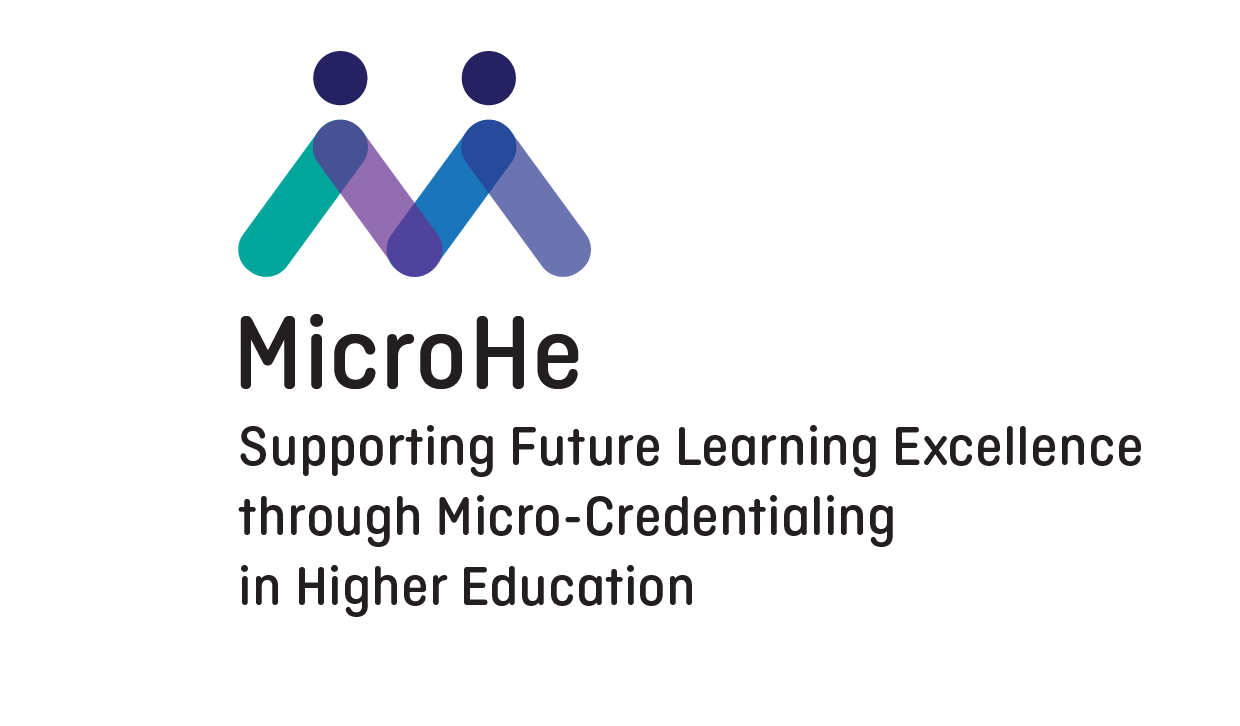While the term micro-credentials is widely used to describe any sub-degree learning experience, whether formal, non-formal or informal, our project aims at looking at credentialing within Higher Education.
MicroHE aims to provide the most comprehensive policy analysis yet conducted of the impact of modularisation, unbundling and micro-credentialing in European Higher Education, and will address the challenges described above by:
- gathering the state of the art in micro-credentialing in European Higher Education today, by organizing the first European survey on micro-credentials in HE, surveying at least 70 institutions across the continent, with the aim of understanding the current level of provision, the types of micro-credentials offered and future trends in provision of micro-credentials
- forecasting the impacts of continued modularisation of Higher Education on HE Institutions by using forward-scanning techniques, specifically through the use of DELPHI methodology
- examining the adequacy of European recognition instruments for micro-credentials, in particular ECTS, the diploma supplement and qualification frameworks
- proposing a ‘credit supplement’ to give detailed information about micro-credentials in a way compatible with ECTS, the diploma supplement and qualification frameworks
- proposing a meta-data standard and developing an online clearinghouse to facilitate recognition, transfer and portability of micro-credentials in Europe.
Impact
In the long-term the project will increase the quality and quantity of micro-credentials on offer within the European Higher Education Area, as well as enable recognition of those same credentials by different educational organizations and employers.
Strategically, it is believed that in the long-term micro-credentials will become a major pillar of university service, alongside teaching of degrees and research.
In quantitative terms, we expect to see a steady linear growth curve in the number of certified micro-credentials, with a shape similar that to the growth in MOOCs.
Funding
This project has been funded with support from the European Commission. This website reflects the views only of the authors, and the Commission cannot be held responsible for any use which may be made of the information contained therein.

Partners and co-operators
Baden-Wuerttemberg Cooperative State University (Duale Hochschule Baden-Württemberg – DHBW) is the first higher education institution in Germany to integrate academic studies with workplace training within the curriculum. With around 34,000 enrolled students, over 9,000 partner companies and more than 125,000 graduates, DHBW counts as one of the largest HE institutions in the German Federal State of Baden-Wuerttemberg. The DHBW Heilbronn is the project coordinator of MicroHE.
The European Distance and E-Learning Network exists to share knowledge and improve understanding amongst professionals in distance and e-learning and to promote policy and practice across the whole of Europe and beyond. With more than 200 institutional members and over 1200 members in the Network of Academics and Professionals (NAP), EDEN assists a wide range of institutions, networks and individuals to become involved in professional information and networking activities.
Vytautas Magnus University – VMU, ranked as the TOP 700 university in QS University ranking, is a classical university of liberal arts with 10 faculties, Music Academy and World Lithuanian University. VMU ISI is among the first institutions in Lithuania and Europe to prepare flexible online organization and curriculum designing regulations, including development and use of Open Educational Resources
The Jožef Stefan Institute is the leading Slovenian scientific research institute, covering a broad spectrum of basic and applied research. The staff of more than 960 specializes in natural sciences, life sciences and engineering.
Tampere University (TAU) conducts scientific research in technology and architecture and provides the highest education within these fields. Since 2010 it has operated in the form of a foundation. At TAU, there are about 10,000 under- and post-graduate students, incl. 1300 international students, and over 160 professors. TAU, with a total annual income of 167 M€, is a research-intensive university, a pioneer in technology transfer and an acknowledged cooperation partner among the scientific and business community.
The Knowledge Innovation Centre (KIC) is a dynamic consultancy focusing on knowledge brokerage and innovation of knowledge transfer processes. The Centre brings together a variety of local and European experts from a variety of fields, and has worked extensively within Quality Assurance of Higher Education, Technology Enhanced Learning, Student Services and the knowledge economy
Fondazione Politecnico di Milano was founded in 2003 through a joint effort between the Politecnico di Milano, major city and regional institutions and important corporations to support the university’s research projects and contribute to innovating and developing the economic, productive and administrative environment. Fondazione Politecnico is committed to building a more effective relationship between the university, industry and public administrations.
K4A is a not-for-profit and an advocate of AI applications and Open Education for reaching the UNs Sustainable Development Goals (SDGS), especially SDG4 “Ensure inclusive and equitable quality education and promote lifelong learning opportunities for all”. The unique ways in which K4A supports its 1000+ researchers and 62 member institutions is by co-funding more than 260 events, 60+ machine learning challenges, 20.000 academic video lectures and creating machine learning tools and software.










